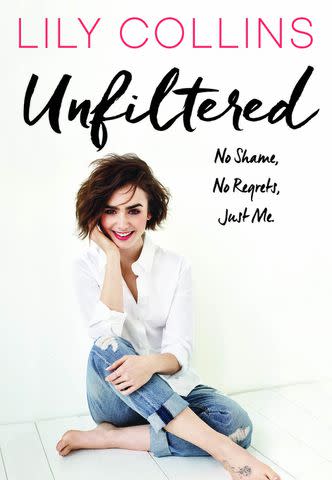How Lily Collins Overcame Eating Disorders, an Absentee Father and Being the 'Definition of Codependent'

Lily Collins shares details about her eating disorders and her dad's struggle with alcohol in her new book, Unfiltered
Lily Collins has packed a lot of living into her 27 years. Now, the actress and daughter of legendary musician Phil Collins is opening up about it all in her new collection of essays, Unfiltered: No Shame, No Regrets, Just Me, in which she gets candid about coping with troubled boyfriends, eating disorders, and an absentee father who abused alcohol.
“It’s definitely like having my diary published,” she told PEOPLE last year of her new book, out Tuesday. “I’m willing to put myself in that awkward position, to be the first to stand up and say, ‘Well, this is something I went through.’ ”
The To the Bone star also explained that she wrote the book to inspire her young fans.
“This is my way to open up conversation with young women and say, ‘Hey, we’re all the same.’ ” said Collins. “We all have the same struggles.”
Read on to learn more about the biggest revelations in the book:

Collins dated an addict, which prepared her for her dad’s struggle with alcoholism
Collins dated a couple of men who struggled with sobriety, she writes.
“The hardest of these relationships was with an ex-boyfriend who used substances as a way to self-medicate, alternating between drugs and alcohol,” she explains. Though he was sober at the beginning of their relationship, that quickly changed.
“When he drank to excess, he worried about everything,” she writes. “He doubted things I’d say and became incredibly insecure. I found myself constantly reassuring him of my affections, and there came a point when nothing I said could make him feel better.”
Eventually the romance ended because his denial of his problem put “too great a strain” on their relationship. Collins writes that this experience with her ex prepared her for her father’s struggles with alcoholism — an addiction so intense it almost killed him.
“Just as it had been with my ex-boyfriend, intervening and speaking up like that was one of the most difficult, frustrating, and painful things I’d ever had to do,” she writes. “And one of the hardest parts was that it was out of my control.
“At the end of the day, the more they refused to admit their problem, the more I was the one who suffered,” she continues. “I felt dumb and disrespected. I felt foolish.”
She addressed those feelings later in the book, as part of an open letter to her dad.
“We all make choices and, although I don’t excuse some of yours, at the end of the day we can’t rewrite the past,” she writes. “I’m learning how to accept your actions and vocalize how they made me feel… I now understand that my frustrations surrounding our communication are not about changing you, but accepting you as you are.”

Collins alleges an ex-boyfriend was emotionally abusive and put his hand around her throat
“I found myself in a romantic relationship filled with deceit, infatuation, codependency, and some pretty dark s—-,” writes Collins of an ex-boyfriend (whom she never names). “I know now that I fell for his image.”
She explains that she tried to be “perfect for him,” but “the more I silenced my voice with this guy, the more isolated I became.”
Collins admits that she even began to distance herself from her mom during that dysfunctional period.
“I became a one-woman island, but not the strong and independent kind,” she explains. “I was the definition of codependent. And worst of all: I became so scared that if I left him, I would have nothing. Be nothing.”
Finally, she says her wake-up call came in the middle of a fiery argument.
“His hand reached out and closed around my neck. Part of me feels strange even calling it choking because I can’t imagine this person doing such a thing, yet it still felt extremely threatening,” Collins writes. “It shocked me to the core and was what made me finally take notice.”
They broke up only to get back together again, but eventually Collins ended the relationship for good.
“I realized that you can love people and you can support them, but you don’t necessarily have to be in a relationship with them to do that,” she told PEOPLE last year about the difficult relationships she’s had. “If [the relationship] is starting to affect you and dim your light and take your spirit away, then you really have to consider stepping back and letting them go through whatever it is they need to go through.”

She battled anorexia and bulimia for years
Collins writes that her relationship with food and her body first changed when she was 16, when her father was separating from her stepmom.
“I couldn’t handle the pain and confusion surrounding my dad’s divorce, and I was having a hard time balancing being a teenager with pursuing two different grown-up careers — both of which I’d chosen myself, but which also focused heavily on how I looked,” she writes of staying slim as an actress and model.
Collins started working out so intensely that “exercise became a form of self-medication.” Added to that, she also started restricting her food intake: She only ate food when she knew how many calories it had.
“Eating was no longer a fun social event, but instead a chore and a punishment,” she writes, “I was exhausted and antsy and bitchy all the time. I sure as hell wasn’t much fun. But my plan was working! I was in control! I was skinny!”
Soon, Collins began using diet pills and laxatives, and relied on them from age 16 until her early twenties. Then, she became bulimic. Collins says she lied to her mom for years to keep her issues with food a secret.
“Between the starvation, the diet pills, the laxatives, and throwing up, I not only lost all of my energy, but my body started to shut down,” she writes. “My hair and nails lost their shine and became brittle. My throat burned and my esophagus ached. My period stopped for a couple of years and I was terrified I had ruined my chances of having kids.”
Eventually, her school noticed. Collins writes that her guidance counselor informed her mother that she wouldn’t be able to return to school unless she brought in a doctor’s note confirming that she was “not medically in danger.”
“Now, it’s just something that’s a part of my past that I keep in check,” Collins recently told Teen Vogue. “I don’t live in the disorder. It doesn’t affect my day-to-day in that I don’t partake in the disorder. It’s a part of who I am, but it’s always something that I look back on and think about in terms of my progress.”
The lessons she’s learned
After unhealthy relationships with men and her body, Collins is now all about self-love.
“You have to come to terms with who you are, be proud of who you are, love yourself, and know what it is you need before you can love someone else fully,” she told PEOPLE. “[Self love] is the one and only love that you need first and foremost.”
For more People news, make sure to sign up for our newsletter!
Read the original article on People.

